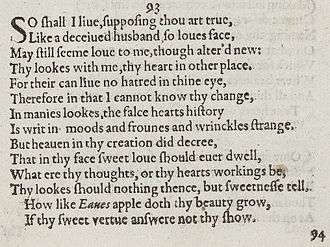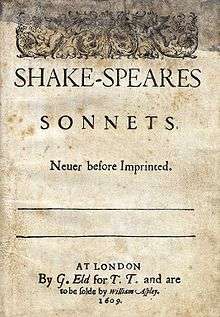Sonnet 93
| Sonnet 93 | |||||||
|---|---|---|---|---|---|---|---|
 Sonnet 93 in the 1609 Quarto | |||||||
|
| |||||||
| |||||||
Sonnet 93 is one of 154 sonnets written by the English playwright and poet William Shakespeare. It is a member of the Fair Youth sequence, in which the poet expresses his love towards a young man.
Synopsis
Contrary to the previous sonnet, Sonnet 92, in which Shakespeare tries to question the young man's morals and character, he may now be fluctuant in his character without his own knowledge. Shakespeare also goes ahead and basically refutes what he had said in the previous sonnet, now saying that the young man is a good person with upstanding morals. He goes on to say, "For there can live no hatred in thine eye". He is now refuting his previous statements and stating that the boy can not have bad morals or vice.
In the first quatrain of the sonnet, the poet says, "So shall I live, supposing thou art true", illustrating the initial doubt in the young man's moral character. Gradually, he starts to reason that the youth's beauty outweighs his moral flaws, a sort of superficial and narcisstic belief that the poet had previously criticized in earlier sonnets. The poet goes on to speak about the young man's facial beauty, without considering the virtue of the young man. Shakespeare acknowledges this possibility by saying, "How like Eve’s apple doth thy beauty grow", showing a connection to Adam and Eve, and how Eve's external beauty was countered by her internal moral lack of character.
Structure
Sonnet 93 is an English or Shakespearean sonnet. The English sonnet has three quatrains, followed by a final rhyming couplet. It follows the typical rhyme scheme of the form, abab cdcd efef gg and is composed in iambic pentameter, a type of poetic metre based on five pairs of metrically weak/strong syllabic positions. The 5th line exemplifies a regular iambic pentameter:
× / × / × / × / × / For there can live no hatred in thine eye, (93.5)
- / = ictus, a metrically strong syllabic position. × = nonictus.
The meter demands a few variant pronunciations: line 2's "deceivèd" has three syllables,[2] and line 9's "heaven" functions as one.[3]
Notes
- ↑ Pooler, C[harles] Knox, ed. (1918). The Works of Shakespeare: Sonnets. The Arden Shakespeare [1st series]. London: Methuen & Company. OCLC 4770201.
- ↑ Kerrigan 1995, p. 123.
- ↑ Kerrigan 1995, p. 290.
References
- First edition and facsimile
- Shakespeare, William (1609). Shake-speares Sonnets: Never Before Imprinted. London: Thomas Thorpe.
- Lee, Sidney, ed. (1905). Shakespeares Sonnets: Being a reproduction in facsimile of the first edition. Oxford: Clarendon Press. OCLC 458829162.
- Variorum editions
- Alden, Raymond Macdonald, ed. (1916). The Sonnets of Shakespeare. Boston: Houghton Mifflin Company. OCLC 234756.
- Rollins, Hyder Edward, ed. (1944). A New Variorum Edition of Shakespeare: The Sonnets [2 Volumes]. Philadelphia: J. B. Lippincott & Co. OCLC 6028485.
- Modern critical editions
- Atkins, Carl D., ed. (2007). Shakespeare's Sonnets: With Three Hundred Years of Commentary. Madison: Fairleigh Dickinson University Press. ISBN 978-0-8386-4163-7. OCLC 86090499.
- Booth, Stephen, ed. (2000) [1st ed. 1977]. Shakespeare's Sonnets (Rev. ed.). New Haven: Yale Nota Bene. ISBN 0-300-01959-9. OCLC 2968040.
- Burrow, Colin, ed. (2002). The Complete Sonnets and Poems. The Oxford Shakespeare. Oxford: Oxford University Press. ISBN 978-0192819338. OCLC 48532938.
- Duncan-Jones, Katherine, ed. (2010) [1st ed. 1997]. Shakespeare's Sonnets. The Arden Shakespeare, Third Series (Rev. ed.). London: Bloomsbury. ISBN 978-1-4080-1797-5. OCLC 755065951.
- Evans, G. Blakemore, ed. (1996). The Sonnets. The New Cambridge Shakespeare. Cambridge: Cambridge University Press. ISBN 978-0521294034. OCLC 32272082.
- Kerrigan, John, ed. (1995) [1st ed. 1986]. The Sonnets ; and, A Lover's Complaint. New Penguin Shakespeare (Rev. ed.). Penguin Books. ISBN 0-14-070732-8. OCLC 15018446.
- Mowat, Barbara A.; Werstine, Paul, eds. (2006). Shakespeare's Sonnets & Poems. Folger Shakespeare Library. New York: Washington Square Press. ISBN 978-0743273282. OCLC 64594469.
- Orgel, Stephen, ed. (2001). The Sonnets. The Pelican Shakespeare (Rev. ed.). New York: Penguin Books. ISBN 978-0140714531. OCLC 46683809.
- Vendler, Helen, ed. (1997). The Art of Shakespeare's Sonnets. Cambridge, MA: The Belknap Press of Harvard University Press. ISBN 0-674-63712-7. OCLC 36806589.
.png)
